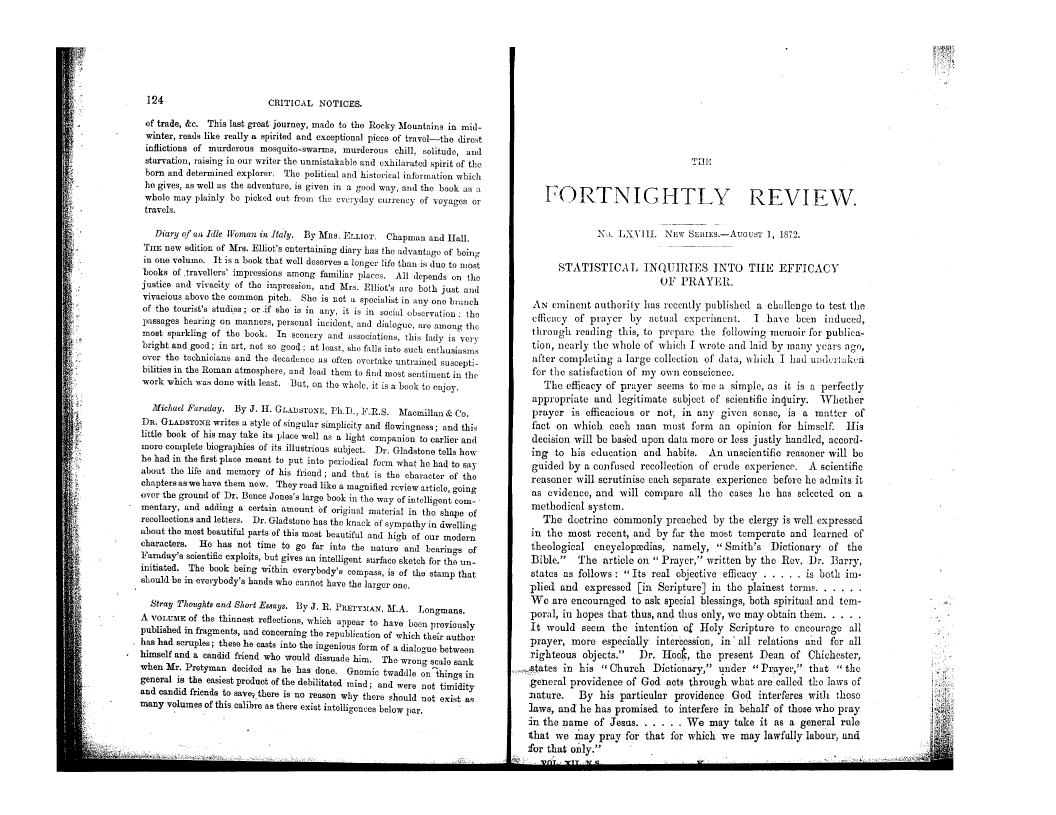OCR Rendition - approximate124 CRITICAL NOTICES.
of trade, &c. This last great journey, made to the Rocky Mountains in midwinter, reads like really a spirited and exceptional piece of travel-the direst inflections of murderous mosquito-swarms, murderous chill, solitude, and starvation, raising in our writer the unmistakable and exhilarated spirit of the born and determined explorer. The political and historical information which he gives, as well as the adventure, is given in a good way, and the book as a whole may plainly be picked out from the everyday currency of voyages or travels.
Diary of an Idle Woman in Italy. By Mas. ELLIOT. Chapman and Hall. TnE new edition of Mrs. Elliot's entertaining diary has the advantage of being in one volume. It is a book that well deserves a longer life than is duo to most books of,travellers' impressions among familiar places. All depends on the justice and vivacity of the impression, and Mrs. Elliot's are both just and vivacious above the common pitch. She is not a specialist in any one branch of the tourist's studies ; or if she is in any, it is in social observation : the passages bearing on manners, personal incident, and dialogue, are among the meet sparkling of the book. In scenery and associations, this lady is very bright and good; in art, not so good; at least, she falls into such enthusiasms over the technicians and the decadence as often overtake untrained susceptibilities in the Roman atmosphere, and lead them to find most sentiment in the work which was done with least. But, on the whole, it is a book to enjoy.
Michael Faraday. By J. II. GL_ DSTONE, Ph.D., F.R.S. Macmillan & Co. DR. GLADSTONE writes a style of singular simplicity and flowingness; and this little book of his may take its place well as a light companion to earlier and more complete biographies of its illustrious subject. Dr. Gladstone tells bow he had in the first place meant to put into periodical form what he bad to say about the life and memory of his friend; and that is the character of the chapters as we have them now. They read like a magnified review article, going over the ground of Dr. Bence Jones's large book in the way of intelligent commentary, and adding a certain amount of original material in the shape of recollections and letters. Dr. Gladstone has the knack of sympathy in dwelling about the most beautiful parts of this most beautiful and high of our modern characters. He has not time to go far into the nature and bearings of f'araday's scientific exploits, but gives an intelligent surface sketch for the uninitiated. The book being within everybody's compass, is of the stamp that should be in everybody's hands who cannot have the larger one.
Stray Thoughts and Short Essays. By J. R. PRETYMAN, M.A. Longmans. A VOLUME of the thinnest reflections, which appear to have been previously published in fragments, and concerning the republication of which their author has had scruples; these he casts into the ingenious form of a dialogue between himself and a candid friend who would dissuade him. The wrong scale sank when Mr. Pretyman decided as he has done. Gnomic twaddle on things in general is the easiest product of the debilitated mind ; and were not timidity and candid friends to saves there is no reason why there -should not exist as many volumes of this calibre as there exist intelligences below par.
T HIT! "I
FORTNIGHTLY REVIEW.
No. LXV11I. Ni's' Si:nuEs.-AuousT 1, 1872.
STATISTICAL INQIJIRIES INTO THE EFFICACY
OF PRAYER.
AN eminent authority has recently published a challenge to test the efficacy of prayer by actual experiment. I have been induced, through reading this, to prepare the following memoir for publication, nearly the whole of which I wrote and laid by many years ago, after completing a large collection of data, which I had undcrtaked for the satisfaction of my own conscience.
The efficacy of prayer seems tome a simple, as it is a perfectly appropriate and legitimate subject of scientific inquiry. Whether prayer is efficacious or not, in any given sense, is a matter of fact on which each man must form an opinion for himself'. His decision will be based upon data more or less justly handled, according to his education and habits. An unscientific reasoner will bo guided by a confused recollection of crude experience. A scientific reasoner will scrutinise each separate experience before he admits it as evidence, and will compare all the cases he has selected on a methodical system.
The doctrine commonly preached by the clergy is well expressed in the most recent, and by far the most temperate and learned of theological encyclopaedias, namely, Smith's Dictionary of the Bible." The article on " Prayer," written by the Rev. Dr. Barry,
states as follows : " Its real objective efficacy is both im
plied and expressed [in Scripture] in the plainest terms
We are encouraged to ask special blessings, both spiritual and temporal, in hopes that thus, and thus only, we may obtain them
It would seem the intention of Holy Scripture to encourage all prayer, more especially intercession, in' all relations and for all righteous Objects." Dr. Hooc, the present Dean of Chichester, ,.,states in his "Church Dictionary," under "Prayer," that "the general providence of God acts through what are called the laws of nature. By his particular providence God interferes with those laws, and he has promised to interfere in behalf of those who pray in the name of Jesus We may take it as a general rule that we may pray for that for which we may lawfully labour, and
for that only."
|

